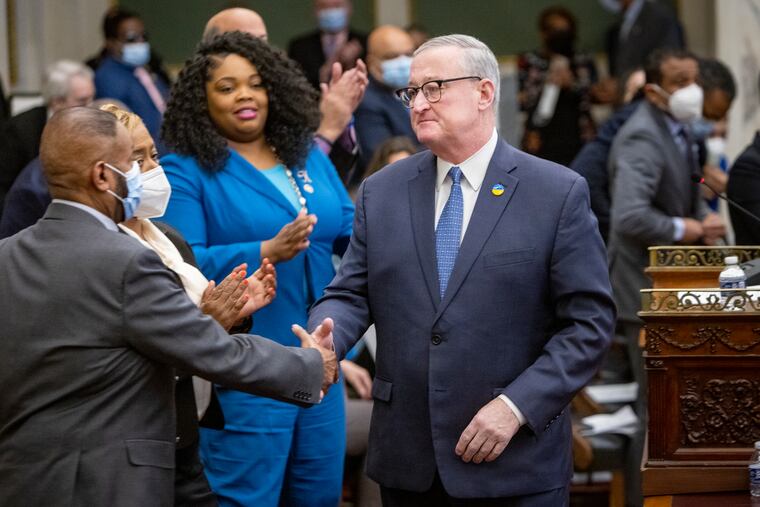In their budget addresses, Biden, Shapiro, and Kenney prudently aim for normalcy | Editorial
A common thread running through the proposals by the president, the governor, and the mayor? A return to stability after years of upheaval caused by the pandemic.

President Joe Biden, Gov. Josh Shapiro, and Mayor Jim Kenney unveiled respective budgets recently that largely showed a return to normalcy after years of upheaval caused by the pandemic.
The budgets strike a balance between taxing and spending as Biden gears up for a likely reelection bid, Shapiro launches his first term, and Kenney winds down his tenure. The good news is there were no major surprises, though the state and city may face shortfalls in the coming years once federal stimulus money disappears.
Biden traveled to the Far Northeast last week to unveil his $6.9 trillion budget, which raises taxes on the wealthiest Americans and invests in the working class. It’s a responsible budget that would cut the deficit by $3 trillion over the next decade while protecting Social Security and Medicare.
Biden rightly called for companies and wealthy individuals to “pay their fair share.” He proposed increasing corporate taxes from 21% to 28%, which would still be below the 35% tax that was in place before Donald Trump slashed the rate in 2017, leading to huge deficits that Republicans suddenly pretend to care about.
Biden proposed a minimum 25% tax on American households worth over $100 million while increasing taxes on stock buybacks and Americans making more than $400,000.
Biden’s proposed tax hikes on the wealthy are aimed at helping middle- and low-income families. His budget includes increased funding for childcare, elderly care, paid leave for workers, free community college, and pre-K for students.
As expected, Republicans trashed Biden’s budget proposal. Since the Republicans control the House, the budget has no chance of passing. But Republicans offered no blueprint of their own.
Instead of serious negotiations, the Republicans — led by Pennsylvania Rep. Scott Perry (R., Insurrectionist) — are focused on a reckless fight over raising the debt limit, which has nothing to do with future spending. Economists warned that Republicans’ refusal to raise the borrowing limit would cripple the economy, hurt the stock market, and cost millions of jobs.
Biden’s budget is a statement of his values, which focuses on fairness. He supports the middle class and the most vulnerable, while the Republicans distract and divide over culture wars and performance politics. It’s a telling contrast.
Shapiro’s $44.4 billion budget, his first since taking office in January, aimed for something almost unheard of in today’s divided politics: bipartisan balance. Shapiro acknowledged that the leaders of the state House and Senate represent different political parties. As such, “nothing gets done” unless a majority in each chamber can agree, he said.
Shapiro proposed spending hundreds of millions of dollars on mental health, public safety, and workforce development — all good news for Philadelphia.
Best of all, perhaps, Shapiro called for increasing the minimum wage in Pennsylvania from $7.25 an hour to $15 an hour. This makes sense on several levels, especially since Pennsylvania’s minimum wage lags behind all neighboring states, including West Virginia.
One area where Shapiro came up surprisingly short was in funding for education. Shapiro proposed increasing education funding for K-12 schools in Pennsylvania by $1 billion. But the increase was far less than what education advocates hoped for in the wake of a judge’s ruling last month that found the state’s system for funding education was unconstitutional and hurt poorer urban and rural districts.
Going forward, Shapiro must play a bigger role in ensuring schools across the state are properly funded. Educating tomorrow’s workers is one of the best investments the state can make.
Perhaps the best thing that can be said about Kenney’s proposed $6.1 billion budget is that it is his last one. Recall when Kenney campaigned for mayor in 2015 he talked about zero-based budgeting, which requires all expenses to be justified each year. He planned to invest the savings in education.
Once elected, Kenney’s zero-based budgeting was replaced by big spending. Over his two terms, Kenney increased spending by 50%, while offering no big initiatives in his second term.
The good news is Kenney proposed freezing property assessments after residents were hit with an average increase of 31% last year. He also proposed modest cuts to the wage and business taxes and will leave the city with a $520 million surplus.
After all is said and done, taxpayers may wonder if they got the most bang for their hard-earned bucks.